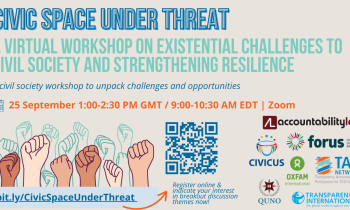Civic Space Under Threat: QUNO NY Co-hosts Workshop

September 2025 marked the opening of the 80th session of the United Nations General Assembly (UNGA) and highlights the final stretch to achieve the 2030 Agenda. As world leaders convened in New York, QUNO NY joined the Accountability Lab, CIVICUS, the Ford Foundation, Forus, and the Transparency, Accountability & Participation (TAP) Network to co-host “Civic Space Under Threat: An Interactive Workshop on Existential Challenges to Civil Society and Strengthening Resilience” virtually on 25 September. The interactive event, which featured thematic breakout group discussions, focused on how civil society organizations (CSOs) can collaborate, emphasized solidarity-driven solutions and explored opportunities for renewed commitments to protect and resource civic actors. Participants discussed advocacy calls and strategies to call on Heads of State and Government aligned with the opening of the UNGA to bring substantive commitments to reversing trends of restriction and repression on civic space and supporting multilateralism through robust civil societies worldwide.
The virtual workshop is a part of a series on ‘Civic Space Under Threat’ that began in July 2025. The series aims to provide space to explore the growing financial and political threats facing civil CSOs. It also fostered discussion on the direct implications for building peaceful, just, and inclusive societies underpinned by Human Rights and the 2030 Agenda, specifically Sustainable Development Goal 16 (SDG16).
The opening of the 80th UNGA session offered a pivotal opportunity to assess the current state of multilateralism and global partnerships. Analysis also took place on the transformation required in governance systems to address overlapping global crises and mobilize political will at the highest level to reverse backsliding, regression, and repression. Against this backdrop, fewer civil society actors were present this year in and around the UN, with limited opportunities to engage, increasing restrictions and the growing fears of many travelling to the US.
As authoritarian ideologies gain traction worldwide, democratic institutions, international norms, and standards are under threat, and the viability and vibrancy of civil society are increasingly at risk. These trends jeopardize progress on SDG 16’s core targets—including accountable institutions, access to justice, and inclusive participation. These trends also weaken the broader social fabric needed for sustainable development and poverty eradication. These factors equal a crisis of multilateralism, which threatens to undermine civil society’s quest to create peaceful, just, equal and sustainable societies.
The discussion series will continue to find ways that CSOs can work in partnership to push back on shrinking civic space and deepen our shared understanding of the challenges growing from the international to the local level. The discussion also spotlights the resilience and innovation of CSOs working in hostile environments, protecting civic freedoms, delivering essential public services, and defending human rights despite declining financial support and increasing repression.
A summary of the discussion can be found below.


